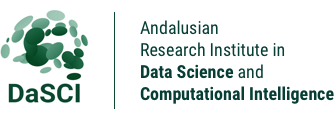PhD Training
One of the main objectives of the DaSCI is to promote research activities through the initial and continuous training (DaSCI Webminars) of future professionals in the area of Data Science and Computational Intelligence and their continuous professional development in universities, research centres or companies that demand this profile for their R&D departments.
Our lines of research are in line with the different areas of research that are worked in the Institute:
- DATA SCIENCE AND BIG DATA (Coordinated by María José del Jesus, Sebastián Ventura and Salvador García)
- COMPUTATIONAL INTELLIGENCE (Coordinated by Luis Martínez and Enrique Herrera)
- DASCI APPLICATIONS (Coordinated by Oscar Cordón and Juan Manuel Górriz)
Attached a list of topics for doctoral theses, dissertations and master’s degrees.
Data Science and Big Data
- Descriptive data mining
- Predictive analytics
- Data preprocessing
- Real-time data analysis
- Big Data
Neural networks. Deep Learning Models
- Design of data/signal/image pre-processing algorithms for DL.
- Design of assembly models of DL algorithms.
- Analysis of the robustness of DL algorithms.
- Use of DL algorithms in different applied fields.
Fuzzy sets and fuzzy systems
- Study of the interpretability and precision of fuzzy linguistic systems.
- Design of models based on fuzzy systems for non-standard classification.
- Design of fuzzy systems for Big Data.
- Analysis of the usefulness of diffuse systems in learning problems associated with social networks, analysis of feelings, etc.
Bioinspired Optimization Algorithms
- Genetic Algorithms (GAs) for continuous optimization problems. your exploration becomes very effective.
- Optimization algorithms for optimization problems with a high degree of dimension.
- Design of more robust and effective optimization tools.
Social Media Mining
- Analysis of opinions
- Modeling and detection of information dissemination processes in social networks
- Social network visualization methods and network-based information visualization techniques
- Recommendation systems
Information Technologies and Decision Making
- Diffuse Decision Making (group, multicriteria):
- Information Fusion.
- Computation with words.
- Uncertainty Modeling.
- New decision models.
- Decision Support Systems applied:
- Emergencies.
- Logistics in various fields (NGOs, emergencies, etc.).
- Integration with technologies:
- Geographic information systems.
- Social networks.
- Negotiation systems:
- Consensus reach processes.
- Policy Decision Making.
- E-commerce.
- Sustainable development.
AI Applications to
- Ambient intelligence.
- Intelligent translational medicine.
- Diagnosis of neurodegenerative diseases.
- Computational models in marketing and business management.
- Forensic identification.
- Biometrics.
- Railway applications.
- Sustainable Development Goals. Forest protection.





